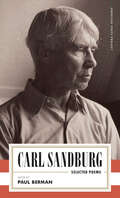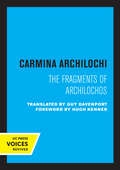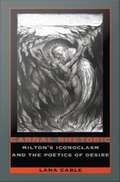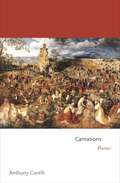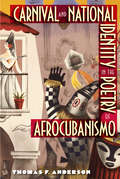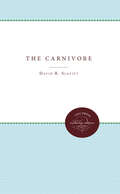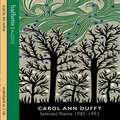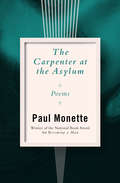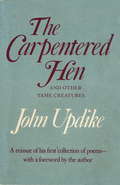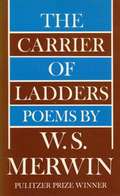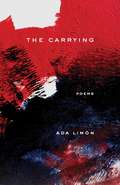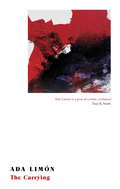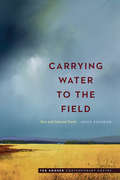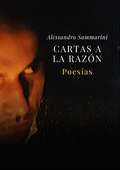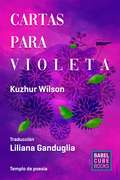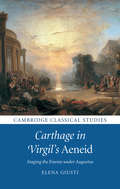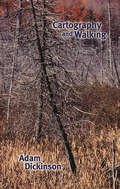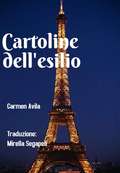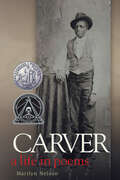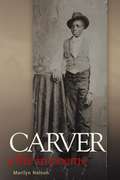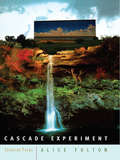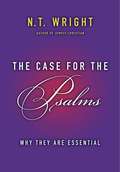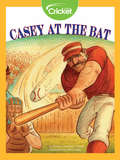- Table View
- List View
Carl Sandburg: Selected Poems
by Carl SandburgA fresh look at the Pulitzer Prize–winning poet laureate of the American MidwestWith the publication of Chicago Poems in 1916, Carl Sandburg became one of the most famous poets in America: the voice of a Midwestern literary revolt, fusing free-verse poetics with hard-edged journalistic observation and energetic, sometimes raucous protest. By the time his first book appeared, Sandburg had been many things—a farm hand, a soldier in the Spanish-American War, an active Socialist, a newspaper reporter and movie reviewer—and he was determined to write poetry that would explode the genteel conventions of contemporary verse. His poems are populated by factory workers, washerwomen, crooked politicians, hobos, vaudeville dancers, and battle-scarred radicals. Writing from the bottom up, bringing to his poetry the immediacy of America&’s streets and prairies, factories and jails, Sandburg forged a distinctive style at once lyrical and vernacular, by turns angry, gritty, funny, and tender.
Carmina Archilochi: The Fragments of Archilochos
by Carmina ArchilochiThis title is part of UC Press's Voices Revived program, which commemorates University of California Press’s mission to seek out and cultivate the brightest minds and give them voice, reach, and impact. Drawing on a backlist dating to 1893, Voices Revived makes high-quality, peer-reviewed scholarship accessible once again using print-on-demand technology. This title was originally published in 1964.
Carnal Rhetoric: Milton's Iconoclasm and the Poetics of Desire
by Lana CableIn recent years, New Historicists have situated the iconoclasm of Milton's poetry and prose within the context of political, cultural, and philosophical discourses that foreshadow early modernism. In Carnal Rhetoric, Lana Cable carries these investigations further by exploring the iconoclastic impulse in Milton's works through detailed analyses of his use of metaphor. Building on a provocative iconoclastic theory of metaphor, she breaks new ground in the area of affective stylistics, not only as it pertains to the writings of Milton but also to all expressive language. Cable traces the development of Milton's iconoclastic poetics from its roots in the antiprelatical tracts, through the divorce tracts and Areopagitica, to its fullest dramatic representation in Eikonoklastes and Samson Agonistes. Arguing that, like every creative act, metaphor is by nature a radical and self-transgressing agent of change, she explores the site where metaphoric language and imaginative desire merge. Examining the demands Milton places on metaphor, particularly his emphasis on language as a vehicle for mortal redemption, Cable demonstrates the ways in which metaphor acts for him as that creative and radical agent of change. In the process, she reveals Milton's engagement, at the deepest levels of linguistic creativity, with the early modern commitment to an imaginative and historic remaking of the world. An insightful and synthetic book, Carnal Rhetoric will appeal to scholars of English literature, Milton, and the Renaissance, as well as to those with an interest in the theory of affective stylistics as it pertains to reader-response criticism, semantics, epistemology, and the philosophy and psychology of language.
Carnations: Poems (Princeton Series of Contemporary Poets #59)
by Anthony CarelliIn Anthony Carelli's remarkable debut, Carnations, the poems attempt to reanimate dead metaphors as blossoms: wild and lovely but also fleeting, mortal, and averse to the touch. Here, the poems are carnations, not only flowers, but also body-making words. Nodding to influences as varied as George Herbert, Francis Ponge, Fernando Pessoa, and D. H. Lawrence, Carelli asserts that the poet’s materials—words, objects, phenomena—are sacred, wilting in the moment, yet perennially renewed. Often taking titles from a biblical vocabulary, Carnations reminds us that unremarkable places and events—a game of Frisbee in a winter park, workers stacking panes in a glass factory, or the daily opening of a café—can, in a blink, be new. A short walk home is briefly transformed into a cathedral, and the work-worn body becomes a dancer, a prophet, a muse.______From Carnations:THE PROPHETSAnthony CarelliA river. And if not the river nearby, then a dreamof a river. Nothing happens that doesn’t happenalong a river, however humble the water may be.Take Rowan Creek, the trickle struggling to lugits mirroring across Poynette, wherein, suspended,so gentle and shallow, I learned to walk, bobbingat my father’s knees. Later, whenever we triedto meander on our inner tubes, we’d get lodgedon the bottom. Seth, remember, no matter how we’dkick and shove off, we’d just get lodged again?At most an afternoon would carry us a hundred feettoward the willows. We’d piss ourselves on purposejust to feel the spirits of our warmth haloing out.And once, two bald men on the footbridge, bowingin the sky, stared down at us without a word.
Carnival and National Identity in the Poetry of Afrocubanismo
by Thomas F. Anderson“Traces the ways that Cuban poets dealt with issues of national identity, reflected in their views of Afrocubanismo, often in response to historical changes in public and official opinions on the most visual manifestation of Afro-Cuban culture: carnival.”—Choice “Uncovers a wealth of literary texts, primarily poems, that chart the impact of las comparsas, Afro-Cuban festival dances, on mainstream Cuban life. . . . Investigates the ways in which the relationship between racial and ethnic divisions, and between castes and classes, created a literary movement full to the brim with emotional and sensational resonances.”—Wasafiri “Underscores the sociopolitical and historical contexts of these poems which have shaped the literary production and message of the Afrocubanismo movement. . . . A tour de force.”—Callaloo “Successfully plumbs the position of the Afro-Cuban performer and brings into sharp relief the way politicians historically sought to affect all elements of Cuban culture.”—New West Indian Guide Carnival and National Identity in the Poetry of Afrocubanismo offers thought-provoking new readings of poems by seminal Cuban poets, demonstrating how their writings affected the development of a recognizable Afro-Cuban identity. Thomas Anderson examines the long-running debate between the proponents of Afro-Cuban cultural manifestations and the predominantly white Cuban intelligentsia, who viewed these traditions as “backward” and counter to the interests of the young Republic. Including analyses of the work of Felipe Pichardo Moya, Alejo Carpentier, Nicolás Guillén, Emilio Ballagas, José Zacarías Tallet, Felix B. Caignet, Marcelino Arozarena, and Alfonso Camín, this rigorous, interdisciplinary volume offers a fresh look at the canon of Afrocubanismo and offers surprising insights into Cuban culture during the early years of the Republic.
The Carnivore (Contemporary Poetry Series)
by David R. SlavittDirectly or obliquely, while reading Gibbon or shopping for toys at F. A. O. Schwarz, Slavitt addresses, invokes, or simply enjoys the civilization that has been the poet's true subject from the time of the wandering bards. Upon the foundation of technical mastery, he has begun to build an oeuvre, to assert himself, and, with insouciance and gaiety, to grow into his majority.Originally published in 1965.A UNC Press Enduring Edition -- UNC Press Enduring Editions use the latest in digital technology to make available again books from our distinguished backlist that were previously out of print. These editions are published unaltered from the original, and are presented in affordable paperback formats, bringing readers both historical and cultural value.
Carol Ann Duffy: Selected Poems
by Carol Ann DuffySELECTED POEMS is a collection of poetry chosen by Carol Ann Duffy from her first four acclaimed novels: STANDING FEMALE NUDE, SELLING MANHATTAN, THE OTHER COUNTRY and MEAN TIME (winner of the Whitbread Poetry Award). It is read by the author - the first time she's recorded her work as an audiobook.
The Carpenter at the Asylum: Poems
by Paul MonetteNational Book Award winner Paul Monette&’s acclaimed first book of poetryOriginally published in 1975, The Carpenter at the Asylum was Monette&’s first literary success. In this collection of poems, he writes with playfulness and candor of everything from fairy tales to the change of seasons. &“All things glitter like fresh milk,&” he writes in one poem. And indeed, these works pull a sparklingly strange beauty from everyday objects and experiences.This ebook features an illustrated biography of Paul Monette including rare images and never-before-seen documents from the Paul Monette papers of the UCLA Library Special Collections.
The Carpentered Hen
by John UpdikeAs a present to John Updike on his fiftieth birthday, and as a treat for his readers, his first book, a collection of light verse originally published twenty-five years ago, is brought back into print, with an author's foreword and some small revisions. Many of these poems were written when the author was a young art student in England and a "Talk of the Town" reporter for The New Yorker, which published over forty of them. They deal with the quiddities of things, the oddities of science, quirks of American life (especially as reported in Life magazine during those smiling Eisenhower years), and moments of epiphany in literature and nature. A number--"Ex-Basketball Player," "Superman," "Mirror," "Quilt"--have been frequently reprinted in anthologies. All show a sharp ear, a fond eye, and an active though not always light-hearted fancy. Written mainly to amuse, Updike's early verse was also, as his foreword states, "a way of dealing with the universe, an exercise of the Word." Admirers who know him mostly through his fiction should be delighted to encounter what he calls "these old evidences of my own high spirits." The Carpentered Hen, in recent years a hard-to-get collector's item, now again. unhinges her wings,abandons her nestof splinter, and sings.
The Carrier of Ladders
by W. S. MerwinPulitzer Prize for Poetry 1971. Merwin has since won a National Book Award for his selected poems and the 2009 Pulitzer for the Shadow of Sirius.
The Carrying: Poems
by Ada Limón<p>Vulnerable, tender, acute, these are serious poems, brave poems, exploring with honesty the ambiguous moment between the rapture of youth and the grace of acceptance. A daughter tends to aging parents. A woman struggles with infertility―“What if, instead of carrying / a child, I am supposed to carry grief?”―and a body seized by pain and vertigo as well as ecstasy. A nation convulses: “Every song of this country / has an unsung third stanza, something brutal.” And still Limón shows us, as ever, the persistence of hunger, love, and joy, the dizzying fullness of our too-short lives. “Fine then, / I’ll take it,” she writes. “I’ll take it all.” <p>In Bright Dead Things, Limón showed us a heart “giant with power, heavy with blood”―“the huge beating genius machine / that thinks, no, it knows, / it’s going to come in first.” In her follow-up collection, that heart is on full display―even as The Carrying continues further and deeper into the bloodstream, following the hard-won truth of what it means to live in an imperfect world.</p>
The Carrying: Winner of the National Book Critics Circle Award for Poetry
by Ada LimónWINNER OF THE NATIONAL BOOK CRITICS CIRCLE AWARD FOR POETRY 2019Ada Limón is a poet of ecstatic revelation . . . a book of deep wisdom and urgent vulnerability' Tracy K. Smith, Guardian'Vulnerable, tender, acute . . . The Carrying is a gift' Natasha Trethewey, Pulitzer Prize-winning poet and former US Poet Laureate'Exquisite poems' Roxane GayFrom National Book Critics Circle Award Winner Ada Limón comes The Carrying - her most powerful collection yet.Vulnerable, tender, acute, these are serious poems, brave poems, exploring with honesty the ambiguous moment between the rapture of youth and the grace of acceptance. A daughter tends to aging parents. A woman struggles with infertility - 'What if, instead of carrying / a child, I am supposed to carry grief?' - and a body seized by pain and vertigo as well as ecstasy. A nation convulses: 'Every song of this country / has an unsung third stanza, something brutal.' And still Limón shows us, as ever, the persistence of hunger, love, and joy, the dizzying fullness of our too-short lives. 'Fine then, / I'll take it,' she writes. 'I'll take it all.'The Carrying leads us deeper towards the hard-won truth of what it means to live in an imperfect world.
Carrying Water to the Field: New and Selected Poems (Ted Kooser Contemporary Poetry)
by Joyce SutphenJoyce Sutphen’s evocations of life on a small farm, coming of age in the late 1960s, and traveling and searching for balance in a very modern world are both deeply personal and familiar. Readers from Maine to Minnesota and beyond will recognize themselves, their parents, aunts and uncles, and neighbors in these poems, which move us from delight in keen description toward something like wisdom or solace in the things of this world. In addition to poems selected from the last twenty-five years, Carrying Water to the Field includes more than forty new poems on the themes of luck, hard work, and the ravages of time—erasures that Sutphen attempts to ameliorate with her careful attention to language and lyrical precision.
Cars What Am I? (First Concepts)
by Disney PixarJoin your favorite friends from CARS as they play a mystery game! Told in rhyme, kids can guess along, "What Am I?" Picture descriptions present.
Cartas a la razón
by Marlo LópezEste camino mío es un viaje a lo largo de veinte años, en el que hay un amor no correspondido que lleva inevitablemente a una crisis de identidad, desarrollándose luego en una nueva relación que llega a la coronación del sueño de amor. Se concluye con un intenso análisis del período vivido, una especie de reelaboración del pasado. De lo alto de tantos estados emocionales se describe la visión en el tiempo, para impulsarse con la mente a buscar y a encontrar personales verdades. La búsqueda de mí mismo comenzó con la intención de amar, con el deseo de enamorarme. El amor es vivido con una reflexión racional y una participación infantil que descubre uno de los planes más bajos del miedo: el miedo de amar. Al revelarse los miedos se descubren las ansias, defensas personales que hacen huir de un peligro irracional, hasta revelar la verdad, en este caso yo mismo.
Cartas para Violeta
by Kuzhur WilsonLos poemas de esta colección, Cartas para Violeta, son un intento de traducir el amor en la naturaleza, el tiempo, y las demás coordenadas de la mente (En la vida anterior y la última/recuerdo contarte que habías encontrado mi poema vagando por algún lugar preguntando el nombre de la primavera). Este trabajo no es una versión poética mejorada de la poesía beta de Kuzhur que ya está instalada en tus sistemas; esta es una colección nicho que se puede segregar dentro de múltiples hebras de información poética. Sin embargo, si este es tu primera vez en esta instalación poética, definitivamente tendrás que probar algunas pocas aplicaciones más de su tienda. La poesía en la Era de la Gran Información Aditya Shankar
Carthage in Virgil’s Aeneid: Staging the Enemy Under Augustus (Cambridge Classical Studies)
by Elena GiustiFounded upon more than a century of civil bloodshed, the first imperial regime of ancient Rome, the Principate of Caesar Augustus, looked at Rome's distant and glorious past in order to justify and promote its existence under the disguise of a restoration of the old Republic. In doing so, it used and revisited the history and myth of Rome's major success against external enemies: the wars against Carthage. This book explores the ideological use of Carthage in the most authoritative of the Augustan literary texts, the Aeneid of Virgil. It analyses the ideological portrait of Carthaginians from the middle Republic and the truth-twisting involved in writing about the Punic Wars under the Principate. It also investigates the mirroring between Carthage and Rome in a poem whose primary concern was rather the traumatic memory of Civil War and the subsequent subversion of Rome's Republican institutions through the establishment of Augustus' Principate.<P><P> Provides a new literary and historicist reading of Virgil's Aeneid and its Augustan context.<P> Investigates afresh the ideology of Caesar Augustus in relation to the wider history of ideologies and autocratic regimes.<P> Engages in a range of approaches of great current interest, such as the representation of the other and the erasure of subalterns from classical texts.
Cartography and Walking
by Adam DickinsonShortlisted for the 2003 Henry Kreisel Award for Best First Book (Writers Guild of Alberta Award) In Cartography and Walking, Adam Dickinson charts his own listening -- an acute listening of eye and ear, a listening with both body and mind. "Cartography" is more than a metaphor for him, it's a way of being. It is how we dwell in the world, and how intimacy enriches such dwelling. Yet "cartography" is the presiding metaphor, the structure of this book; in giving it such a place, Dickinson reminds the reader of that very human impulse to plot, to imagine. Each poem is itself a kind of mapping, through language and sound, through minute observation, until land, love, and everyday life are given new embodiment, are newly discovered, and a reader finds new countries in strangely familiar settings.
Cartoline dell'esilio
by Carmen AvilaImmagini poetiche che descrivono la sua permanenza in città straniere, un’opera permeata di emozioni come il rimpianto e il desiderio di trovarsi in due posti al tempo stesso. Nostalgia di un esilio volontario, in cui mette in discussione le città, ponendole dinanzi al loro lato oscuro, alla bellezza e alla meraviglia, a partire dalla solitudine che provoca l'essere straniera in un’altra terra.
Carver: A Life in Poems
by Marilyn NelsonGeorge Washington Carver was born a slave in Missouri about 1864 and was raised by the childless white couple who had owned his mother. In 1877 he left home in search of an education, eventually earning a master's degree. In 1896, Booker T. Washington invited Carver to start the agricultural department at the all-black-staffed Tuskegee Institute, where he spent the rest of his life seeking solutions to the poverty among landless black farmers by developing new uses for soil-replenishing crops such as peanuts, cowpeas, and sweet potatoes. Carver's achievements as a botanist and inventor were balanced by his gifts as a painter, musician, and teacher. This Newbery Honor Book and Coretta Scott King Author Honor Book by Marilyn Nelson provides a compelling and revealing portrait of Carver's complex, richly interior, profoundly devout life.
Carver: A Life In Poems
by Marilyn NelsonGeorge Washington Carver was born a slave in Missouri about 1864 and was raised by the childless white couple who had owned his mother. In 1877 he left home in search of an education, eventually earning a master's degree. In 1896, Booker T. Washington invited Carver to start the agricultural department at the all-black-staffed Tuskegee Institute, where he spent the rest of his life seeking solutions to the poverty among landless black farmers by developing new uses for soil-replenishing crops such as peanuts, cowpeas, and sweet potatoes. Carver's achievements as a botanist and inventor were balanced by his gifts as a painter, musician, and teacher. This Newbery Honor Book and Coretta Scott King Author Honor Book by Marilyn Nelson provides a compelling and revealing portrait of Carver's complex, richly interior, profoundly devout life.<P><P> Newbery Medal Honor book
La casa y el ladrillo
by Mario BenedettiMARIO BENEDETTI nació en 1920 en Paso de los Toros, República Oriental del Uruguay. Entre 1938 y 1941 residió en Buenos Aires. En 1945 integró la redacción del semanario uruguayo Marcha. En 1949 publicó Esta mañana, su primer libro de cuentos, y un año más tarde, los poemas de Sólo mientras tanto. En 1953 apareció su primera novela, Quién de nosotros, pero fue con el volumen de cuentos Montevideanos, publicado en 1959, que tomó forma la concepción urbana de su obra narrativa. Con La tregua, que apareció en 1960, Benedetti adquirió trascendencia internacional. La novela tuvo más de cien ediciones y fue traducida a diecinueve idiomas. En 1973 debió abandonar su país por razones políticas y residió en la Argentina, Perú, Cuba y España. En 1987 recibió el Premio Llama de Oro de Amnistía Internacional por su novela Primavera con una esquina rota, en 1999 el Premio Reina Sofía de Poesía Iberoamericana y en 2005 el Premio Internacional Menéndez y Pelayo. También obtuvo cuatro Doctorados Honoris Causa otorgados por las universidades de Alicante, de Valladolid, de La Habana y de la República de Montevideo. Sus libros más recientes son La borra de café (1992), Perplejidades de fin de siglo (1993), El olvido está lleno de memoria (1994), El amor, las mujeres y la vida (1995), Andamios (1996), La vida ese paréntesis (1998), Buzón de tiempo (1999), Rincón de Haikus (1999), El mundo que respiro (2001), Insomnios y duermevelas (2002), El porvenir de mi pasado (2003), Defensa propia (2004) y Adioses y bienvenidas (2005). Su obra poética ha sido recogida en Inventario Uno (1950-1985), Inventario Dos (1986-1991) e Inventario tres (1991-2001) publicados en este mismo sello editorial, al igual que sus Cuentos completos (1994).
Cascade Experiment: Selected Poems
by Alice FultonHighlights from each of Alice Fulton's groundbreaking, prize-winning poetry books. Over the past twenty years, Alice Fulton has emerged as one of the most brilliant and honored poets of her generation. She is also among the most thrillingly inventive, compassionate, and necessary. Cascade Experiment charts the evolution of a poetics that revises the limits of language, emotion, and thought.
The Case For The Psalms: Why They Are Essential
by N. T. WrightOne of the world's most trusted Bible scholars, N. T. Wright turns his attention to the central collection of prayers that Jesus and Paul knew best: the book of Psalms. Wright points out that the Psalms have served as the central prayer and hymnbook for the church since its beginning--until now. In The Case for the Psalms, Wright calls us to return to the Psalms as a steady, vital component of healthy Christian living. Reading, studying, and praying the Psalms is God's means for teaching us what it means to be human: how to express our emotions and yearnings, how to reconcile our anger and our compassion, how to see our story in light of God's sweeping narrative of salvation. Wright provides the tools for understanding and incorporating these crucial verses into our own lives. His conclusion is simple: all Christians need to read, pray, sing, and live the Psalms.
Casey at the Bat
by Ernest Lawrence ThayerThe Outlook wasn't brilliant for the Mudville baseball team that day, but Casey was up to bat. Will Casey help them win the game?
